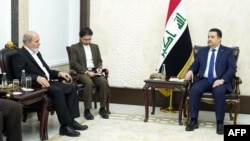Iraq is working for regional "de-escalation," Prime Minister Mohamed Shia al-Sudani said Monday as he welcomed a senior Iranian security official to Baghdad, with tensions high over U.S. strikes in the country and the war in Gaza.
Ali Akbar Ahmadian, secretary of Iran's Supreme National Security Council, also spoke with the Iraqi national security councilor Qassem al-Araji and discussed the "regional political and security" situation.
Tehran, one of Iraq's leading trade partners, wields considerable political influence in Baghdad. Its Iraqi allies dominate parliament and appointed the current government.
"Iraq has deployed, and continues to deploy, important efforts towards preserving stability and establishing de-escalation, in the interests of all the people of the region," Sudani told Ahmadian, according to a statement from his office.
On Friday, the United States launched a wave of strikes in Syria and Iraq against elite Iranian forces and pro-Tehran armed groups.
They were in response to a drone attack on January 28 that killed three U.S. soldiers at a base in Jordan close to the Syrian border.
The strikes in Iraq, close to the border with Syria, killed 16 fighters from Hashed al-Shaabi, a coalition of mainly pro-Iran paramilitaries now integrated into Iraq's regular security forces.
The attacks took place in the context of wider escalation and violence gripping the Middle East following the start of the Israel-Hamas war.
In mid-January, Tehran launched its own strike in Iraq's autonomous Kurdistan region at what it called a "headquarters" used by Israel's Mossad intelligence agency.
That allegation, to which Israel has not responded, was denied by security officials in Baghdad.
"The Iraqi government has demonstrated its attachment to the principle of good neighborliness and the establishment of the best possible relations with the countries of the region and the world, without this coming at the expense of Iraq's sovereignty and security," said Sudani during the meeting, according to his office.




